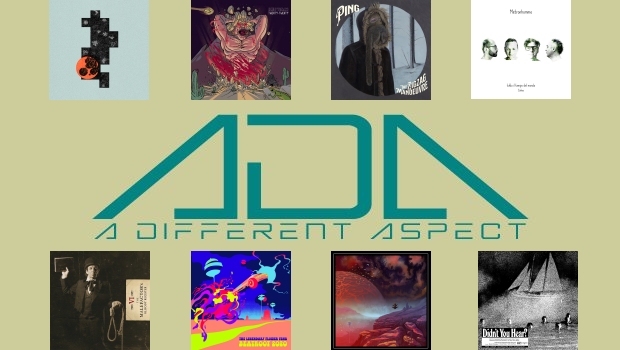In this update we feature:
• Tromb – I/O
• Ikitan – Twenty-Twenty [EP]
• Ping – The ZigZag Manoeuvre
• Métronhomme – Tutto Il Tempo Del Monde ~ 1.òikos [EP]
• Vulture Industries – The Malefactor’s Bloody Register
• The Legendary Flower Punk – Beatroot 2020
• Caelestra – Black Widow Nebula
• Mort Garson – Didn’t You Hear?
Nick Hudson
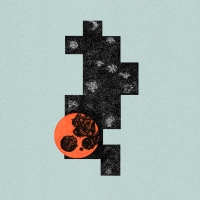
December is often seen as a quiet month for releases. At least, that’s the excuse a lot of magazines and websites use for ignoring the month when compiling their end of year lists. But 2020 sure included a heck of a lot of bloody good releases in the last month of the year. It’s absolutely astounding that so many of these will receive no, or next to no, attention – and especially when they are as good as I/O from Swedish band Tromb, who create a wonderful fusion of post rock and jazz. There are plenty of post and math rock bands that have hints of jazz in their composition, but Tromb reverse the equation (or the input and output?). This is an absolutely fabulous concoction that takes the tropes of post rock and jazz fusion and puts a whole new twist on the recipe.
With no offence to the rest of the band, the absolutely essential ingredient for me is the saxophone of Tom Gabrielsson. At least, that was my first impression, so much of an impact does his playing have when it appears. But it quickly becomes apparent that the saxophone is not so much the vital ingredient as the icing on a perfectly baked cake. And that cake is amazing! Terje Lundén (guitar), Karl Boson (bass), and Svante Burman (drums) are so perfectly in each other’s pockets that not one stands out. Gabrielsson joins in this overlapping blend, as often he and Lundén are playing riffs in tandem. Nice!
I’m not sure how much of the album is improvisation, and how much is composition, and I suspect it is a healthy helping of each. A spoonful of spontaneity helps the melody go down, and all that… A friend of mine recently made the comment that when it come to defining something as jazz, you need to identify if it is rock musicians playing with jazz, or jazz musicians playing with rock. Tromb is certainly the latter, and yet I get the feeling that even those who have an aversion to jazz might still enjoy I/O, with its heavy and meaty riffs and post rock “structure” (in so much as it is possible to have such structure within improvisational compositions). It’s a great shame that because of when this album was released, a lot of people may miss out on it. Make sure you’re not one of those. This album is amazing!
Nick Hudson
![Ikitan - Twenty-Twenty [EP] Ikitan - Twenty-Twenty [EP]](https://theprogressiveaspect.net/wp-content/uploads/2021/02/Ikitan_ADA.jpg)
What better way to commemorate 2020 than by composing a twenty-minute-and-twenty-second song and calling it Twenty-Twenty? Italian band Ikitan do just that, and it’s rather fabulous. The track begins with an optimistic tone, and with no foreshadowing of the doom that is to follow. There were very few people at the beginning of 2020 who could have realised just how misplaced any optimism for the new year might be, and the way Twenty-Twenty replicates this works extremely well. After a very short crescendo in conventional post-rock structure, the enormity of the piece crashes down in approximately the second minute. It’s now a heavier piece, but there is still a healthy dollop of upbeat energy to it. People are aware of the novel coronavirus, but it’s still something that seems removed from them personally. It happens to other people in other places. Eventually all succumbs to the squalls and squeals of tortured guitar histrionics. And later on, some incredibly chunky and heavy music that you feel as much as hear. Indeed, the music in later stages could well include the devastating stone crushing sounds of Ikitan, as depicted in the cover art.
But, even if 2020 were, as Ikitan themselves describe it, “the year from hell”, there’s still something glorious about Twenty-Twenty. It never descends to the depths that the year did. It hovers near the bottom, but never reaches it. There are some truly unsettling passages that pummel and assault the listener with a barrage of brutal sound. But, like almost every musical piece I’ve heard created out of the chaos of 2020, Twenty-Twenty retains an optimistic spark that carries it through, and ultimately comes out, if not triumphantly, alive and whole. Over the twenty-minutes-and-twenty-seconds, a surprising amount of musical ground is covered. Given the post-nature of the band, comparisons with Long Distance Calling and Godspeed You! Black Emperor are probably not surprising, but I’d also add that I can hear a lot in Ikitan’s atmospheric instrumental music that is reminiscent to me of Tool and Amplifier, particularly the former. If Tool were a post-rock band, they might very well sound like Ikitan. Easily a contender for best EP of 2020. Absolutely, gloriously, awesome. Even if I’m not particularly looking forward to 2021, I can’t wait to hear Twenty-Twenty-One!
Nick Hudson

Every time I play this album, I wonder how I did not include it in my list of favourite releases from 2020. It’s an absolute blast, and from the moment the album starts with the gloriously upbeat and bonkers Londonderry Revolutionary, you know you’re in for a trip. Ultimately, I think what kept this from my list was the horror that was 2020. In any other year, albums like this and Aksak Maboul’s Figures would have been right near the top of any list I made. But in a year as insane and confounding as 2020, I think I shied away from the more wonderfully eclectic music I would normally spend most time listening to. Indeed, I’ve had this album for review purposes for months, but every time I think about listening to it for review, I find a reason to procrastinate and put it away for another day. And that is not fair at all on the music, and is more an indictement of my listening preferences in 2020, than of the music of Ping.
So what is Ping? Well, I’m not sure you can pigeonhole their music, apart from to agree it is full of intensity and attitude, as it traverses terrain such as RIO, jazz, funk and punk in a joyous combobulation of noise and melody, and discord and harmony. My absolute favourite tracks are the opener and closer, which have surely been chosen for their positions due to their strength, and encapsulation of all that comes between. But there’s genuinely not a weak or disinteresting track on the album. The album is certainly well-named, as it zigs and zags, with every zag and every zig keeping listeners on their toes, and fully engaged. It is not just the music, either, as the vocals can provide as much of a surprise. This is an album that is near impossible to listen to in the background, and why would you want to?
Nick Hudson

I first became aware of Italian band Métronhomme when their 2019 album, 4, caught my eye. It was the cover art that drew my attention, but the music within was equally beguiling. Although titled 4, and in a sense their fourth release, I understand it was their first without collaborating with another party, and as a more conventional album rather than to accompany some other production. I’ve never heard any of those previous works, so I can’t know how different 4 is, but from how it sounds, I assume it is quite a leap. An instrumental work, 4 is an intriguing meeting of jazz and space rock, of electronic and acoustic sounds. It’s thoroughly delightful, and I made sure to remember the name Métronhomme. So, sure enough, when they released an EP named Tutto Il Temp del Mondo – 1. Òikos, it had my attention.
I have no knowledge of Italian, but my classes in French lead me to guess this EP is entitled ‘All the Time in the World’. Unless Òikos is also an Italian word. My Classical studies lead me to assume this is the Greek concept of family and house. This would make a lot of sense, given the EP came out of the lockdowns and quarantines of 2020. Just to ram it home, the opening number is entitled Quarantine. The immediate sound of this release is vastly different from 4, as it feels almost swamped by darkness, anxiety and dread that is palpable. There is none of the light-heartedness that peppered 4. This is almost, yet not quite, gloomy. But there is always a spark of hope that is never put out, always flickering away in the background. It makes for very interesting listening.
What I really notice though, is the huge leap in sound and style from 4. While 4 was easy to listen to, and immediately accessible, Tutto Il Tempo del Monde – 1. Òikos seems intent on taking us out of our comfort zones. It’s more experimental and spontaneous, sometimes unsettling but never threatening. It’s music as catharsis and medicine – a means of coping with a situation out of our control. It’s more stark, more sparse, more minimal, more inorganic than 4. And it’s all the better for this. The instruments and instrumentation feel more like effects than music, almost giving an ambient effect – though ambient music this is not. The same can be said for the use of voice, whether sung or sampled, because unlike 4 this is not a fully instrumental release. Definitely one of the best EPs I’ve heard from 2020, and I very much hope that the title indicates that there will be a second part forthcoming.
Nick Hudson
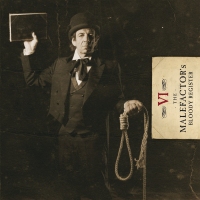
I love Vulture Industries, and associate them with other avant acts from Norway like Atrox and Manes. I don’t believe there’s been any connection between the bands, apart maybe from touring together, but all three play with a dark, heavy, funky, groovy, twisted avant rock that pounds and beats listeners with its contorted visions. I first came upon the band with The Tower and somehow never looked back to their previous release, 2010’s The Malefactor’s Bloody Register – which conveniently receives a 2020 re-release to celebrate its tenth anniversary. As I’m not familiar with the original, I can’t tell if the sound is any different or better, but I can tell you that this is a fantastic beast of an album.
It’s Roger Waters howling and screaming at everyone as he builds a wall, but taken to even greater extremes, as vitriol is blasted in every direction, and with considerable vocal theatrics and acrobatics from Bjørnar Nilsen, who is reminiscent of Mike Patton, not because he sounds like him (he doesn’t), but because of the way he uses his voice as an instrument and a weapon, and in such a variety of ways. The rhythm section of Tor Helge Gjengedal (drums) and Kyrre Teigen (bass) are amazing, while the guitars of Øyvind Madsen and Eivind Huse chug away. In addition, there’s some fabulous added instrumentation in the form of cello, viola and saxophone, and even Herbrand Larsen (best known for his time in Enslaved) on Hammond organ. I don’t think this is Vulture Industries best album (by which, of course, I mean I don’t think it’s my favourite, rather than best), but it’s a great place to start. If you like this, you’ll love what comes after. And if you don’t, well, you probably won’t.
Nick Hudson
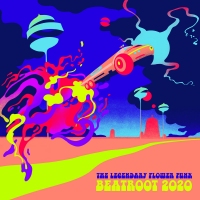
Beatroot 2020 is the latest album from Kamille Sharapodinov’s “other” band. I recently reviewed The Grand Astoria’s From the Great Beyond, but this album is no less enjoyable – if an entirely different beast. Both The Grand Astoria and The Legendary Flower Punk play psychedelic music, but where the former has a jazz fusion vibe that tends towards rock, stoner and doom; the latter still has a jazz fusion vibe, but one that tends towards funk, dance and trance. In fact, I’m glad to see that the band has used the Krautrock tag on their Bandcamp page, because it absolutely fits in that camp too. Like so many other releases in 2020, this album was inspired by the lockdowns and quarantines that took place across the globe. The Bandcamp page explains it thus: “Literally in the last hours before quarantine and self-isolation we gathered in our rehearsal room, set the recording rig and then jammed and jammed and jammed.”
The sheer joy of the spontaneous jamming of performing live new and old material shows. This is a bunch of musicians giving their all before they have to go home and stay home, and doing their best to make all the noise and notes they would have played if their tour were not cancelled. This album is actually a compilation of those gigs that never happened, as from all the material from the jam sessions, a series of sets were compiled – one for each date that didn’t get to happen. For those who find this one album is not enough, all sixteen gigs that never were can be purchased from the band’s live Bandcamp page (yes, they have one page for studio recordings, and one for live). Honestly, this album is such a blast, when life is getting me too down (which it has far more than I’d like in the last few months), even if I don’t often listen to it front to back (There are three tracks out of the ten on the album that by themselves make up around ninety minutes of music!)
Nick Hudson
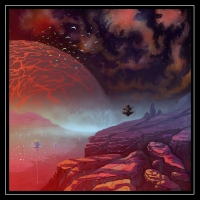
Caelestra is the vision of Frank Harper (The Fever Sea), and is a sidereal slice of progressive black metal fused with ’80s synthwave and sci-fi. It’s a compelling combination that no longer surprises me like the first time I came across it (via Italian band Progeni Terrestre Pura), but continues to enchant. Caelestra reminds me very much of pTp, and that should be considered high praise, because they are pretty much the epitome of sci-fi black metal, and what any band pursuing this niche should aspire to. On the other hand, they will never be mistaken for pTp, which is just as important, as there is no point in being derivative. In fact, I have no idea if Frank Harper is even familiar with pTp, and there is every chance he is not. But I would now put Caelestra right up there with pTp in terms of quality and innovation. It’s hard to believe this is a debut, and I guess in a way it is not – but you couldn’t ask for a more fully realised vision than this. It deserves hyperbolic descriptors such as cinematic, that I normally hesitate to use. The many moods and textures of Black Widow Nebula really do give the sense of taking the listener on a journey. Harper states that the album was “inspired as much by Gojira, Ihsahn and Devin Townsend as it is by Vangelis, Tangerine Dream and Maurice Jarre”, and that definitely shows.
Thus, one thing I particularly like is that the black metal does not dominate, and nor do the harsh vocals. There are some truly beautiful soundscapes produced by Harper, that co-exist with the most brutal of passages. Layers of synth sounds pervade and colour the music so that it is the aural equivalent of the cover art. The drums sound programmed and processed, which would normally be a problem for me, but I absolutely love them within this type of music (just as I love them in pTp). The artificial sound of the drums perfectly complements the overall tone and theme of the album. Black Widow Nebula is an album that I’m sure I would have included in my end-of-year list, had it been released earlier in the year. The only reason I left it out was because I was afraid of recency bias. However, the more I move away from its release date, and the more I listen to and enjoy it, the more I feel guilty for having been over-cautious, and leaving it out. This is a truly fabulous debut that has much to offer the adventurous listener.
Nick Hudson
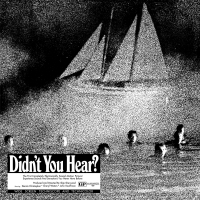
This intriguing soundtrack is actually from 1970, but could easily have soundtracked 2020, the year it finally received not only an official re-release, but also its first conventional release. Often bootlegged, the original album could only be purchased from the lobby at screenings of the film it soundtracked. Mort Garson, like so many session musicians, is a name not widely known, apart perhaps from his magnificently bizarre Plantasia album which was released last year (originally released in 1976). Garson had been working in the music industry from the 1950s not just as a musician but in any capacity for any or all of the roles on any given session: composer, arranger, orchestrator, conductor, you name it, Garson would do it, and do it well. He wrote hit singles, composed advertising jingles, and incidental music for film.
More importantly, when it comes to this album, after Garson met Robert Moog in 1967, he became one of the first arrangers and composers to work with the Moog synthesizer, and his early electronic albums are now highly prized among collectors. You’re unlikely to come across an original copy of this soundtrack, and if you do you’re unlikely to be able to afford it. But for those who don’t want a bootleg, 2020 finally sees Didn’t You Here? receiving a long overdue (re)release. And it is so worth your time. Ignore the first and last tracks, and dip straight into the strange and wondrous sounds of one of the the first all-electronic film soundtracks (I mean, if you want to listen to the first and last tracks, there’s nothing stopping you – but be aware that they’re really not representative of the score. I don’t dislike them, but find they detract from what makes the remainder sound so innovative and unique.)

